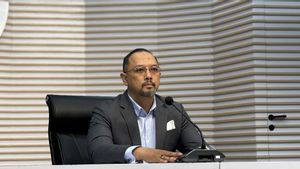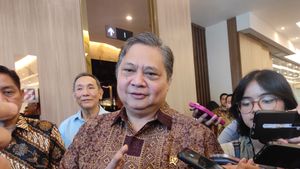JAKARTA - The creators of murals and graffiti containing criticism of the government are threatened with criminalization by the authorities. The mural that was deleted has an image that allegedly resembles President Joko Widodo, which reads '404: Not Found' in Tangerang, "Forced to be Healthy in a Sick Country" in Pasuruan and 'the real epidemic is hunger' has received attention from the Jakarta Legal Aid Institute (LBH).
Teo Reffelsen, one of the public lawyers for LBH Jakarta, said that the removal of murals and graffiti is a clear proof of the decline of democracy. In fact, the government is branded increasingly anti-public criticism.
"Murals and graffiti containing criticism of the government are forms of expression and aspirations conveyed through art," he said when confirmed by VOI, Wednesday, August 18, evening.

According to Teo, this is guaranteed and protected by the 1945 Constitution, the International Covenant on Civil Rights which has been ratified through Law No. 12 of 2005, Law no. 39 of 1999 concerning Human Rights, so it cannot be limited and removed haphazardly.
"Removal and threats of criminalization against the people who make murals and graffiti are acts of repression. And silence on people's expressions and aspirations," he said.
Seeing this phenomenon, the space for public expression in the public sphere is getting narrower. In fact, continued Teo, murals and graffiti have been removed and the threat of criminalization by the authorities against the artists who created them is also in sight.
Teo said, a few regulations have blocked the expression of public complaints during the PPKM period. The public is also prohibited from holding demonstrations on the grounds of the COVID-19 pandemic, then expressions and opinions on social media are also haunted by police reports using the ITE Law and other rubber articles.
LBH Jakarta assesses that the police cannot carry out legal proceedings against the people who made the murals and graffiti on the grounds that the President is the Leader and the National Emblem.
This is because, said Teo, messages conveyed by citizens through murals such as a figure resembling a president or graffiti with criticism of the state are a form of expression and critical aspirations of citizens towards the incumbent President.
"The murals and graffiti are a form of public opinion on the performance of the President and his government," he said.

Teo continued, the President is not a State Emblem as stated in Article 36A of the 1945 Constitution and Article 1 paragraph (3) in conjunction with Article 46 of the Law of the Republic of Indonesia Number 24 of 2009 concerning the Flag, Language, State Emblem, and National Anthem.
In addition, the Constitutional Court (MK) through its Decision Number 013-022/PUU-IV/2006 has stated that Articles 134, 136, and 137 of the Criminal Code related to the offense of insulting the president are contrary to the constitution and must be annulled.
"If there are objections and it is judged that there is an alleged violation, it is a civil or administrative violation, not an approach to criminal law enforcement," he said.

Highlighting this polemic over the space of expression, LBH Jakarta urges the President of the Republic of Indonesia to order the Chief of the Indonesian National Police to respect the freedom of expression and opinion of the people.
Then the Chief of Police to respect the freedom of expression of the people and stop all forms of repression against the space for freedom of opinion.
"The Minister of Home Affairs of the Republic of Indonesia ordered the Regional Head to order the Civil Service Police Unit to respect the right to freedom of expression and opinion of the people. Stop the repressive actions of banning and removing murals or graffiti containing social criticism," he said.
The English, Chinese, Japanese, Arabic, and French versions are automatically generated by the AI. So there may still be inaccuracies in translating, please always see Indonesian as our main language. (system supported by DigitalSiber.id)













